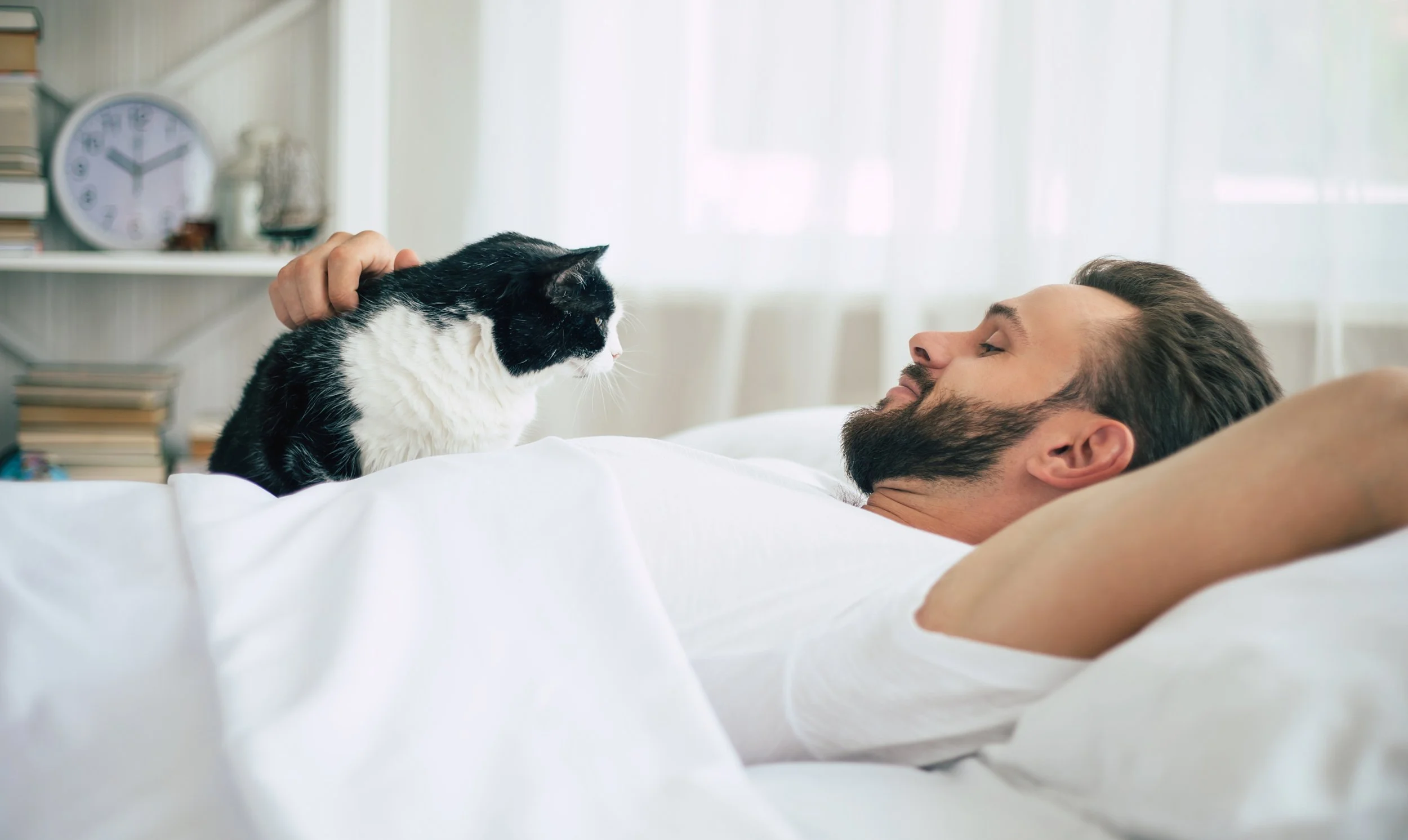Why Does My Cat Wake Me Up So Early, and What Can I Do About It?
Have you ever been awoken by a hungry cat walking up and down on your body, attacking your feet, or screaming their meows from down the hallway? Cats are like natural alarm clocks – always seemingly wanting to wake us up as soon as the sun is up.
But why do cats wake us up so early? Is there anything you can do about it? Let’s take a closer look at your cat’s early-bird behaviour and see what can be done to help take the edge off those early mornings.
Cats Are Naturally Crepuscular
This is a fancy way of saying cats are most active at dawn and dusk. Animals that exhibit this trait are referred to as crepuscular, and it often goes hand-in-hand with being a skilled hunter.
In the wild, dawn and dusk are prime hunting times. Animals are usually a bit tired and have their guard down during these times. They’ve either spent all day surviving or they slept and are just waking up. Regardless of the time, their guard is usually down.
So, why does this matter if you have house cats? Despite being mostly domesticated, cats have maintained many of their survival instincts for thousands of years. This doesn’t mean a lifelong housecat would make a good hunter if suddenly left to their own devices, but it does mean that most cats are still driven by their instincts in a lot of situations. When they wake you up at five in the morning, it’s not personal. It’s biology.
They Want Breakfast Now
Cats love routine, and if you ever fed your cat early in the morning (even once), congratulations! You may have set a lifelong expectation. Since their internal clock starts going off with the rising of the sun, even if you haven’t fed them early in the morning before, they might just start crowing until you get up and fill their bowl.
Boredom Affects All Creatures
If your cat sleeps all day and doesn’t get much stimulation before bed, they may be wide awake and looking for action just as you're winding down or trying to sleep in. As always, this is why we stress the importance of play. Playing with your cat doesn’t just tucker them out and make it easier to sleep in; it also strengthens your bond and brings you closer together.
Some of the more typical early morning zoomies include:
Sprinting around the house
Knocking things off shelves
Scratching at doors
Meowing outside your bedroom
Don’t think of these activities as a nuisance; think of them as your cat reaching out to you for more interaction – they love you!
They’re Responding to Environmental Cues
Cats are incredibly sensitive to light and sound. If your home gets bright early, or if the birds outside start chirping, your cat may take that as a sign that the day has begun and it’s time for you to get up too.
They Just Used the Litter Box
Some cats will race around after going to the bathroom. There is a good chance that yours might be going to the bathroom when they wake up, then getting the post-litterbox zoomies. While it’s nothing to worry about, it does make it less appealing to think about their paws on your bedding.
When to Talk to the Vet
If your cat’s early wake-ups are sudden, intense, or accompanied by other behaviour changes (like excessive meowing, restlessness, or weight loss), it's worth checking in with your vet.
Hyperthyroidism, cognitive decline in senior cats, or other underlying health issues can cause sleep disruptions or early-morning confusion, and these are not problems you can solve without help.
What to Do
Here are a few tips to help shift your cat’s schedule and let you sleep in peace!
Tire Them Out Before Bed
Engage in an energetic play session 30–60 minutes before bedtime using:
Wand toys
Laser pointers
Interactive chase games
If you follow this up with a small meal to mimic a hunt-eat-sleep cycle, you might see some fabulous results.
Don’t Reinforce the Behaviour
Though it might be tempting to get up just to make the meowing stop, doing so teaches your cat that early-morning pestering works. If you are able to ignore them when they first start at five or six in the morning, they will likely just go back to sleep for that period.
You might consider:
Avoid feeding or playing with them until your planned wake-up time
Try using an automatic feeder so the food appears without you being involved
Create a Stimulating Daytime Environment
Cats that are active during the day are more likely to sleep through the night.
If you fill your home with engaging activities for your cats, they might just tucker themselves out before bed every night!
Consider building or buying:
Window perches with a view of bird feeders
Cat trees and tunnels
Food puzzles or treat-dispensing toys
Background sounds like bird videos or calming cat TV
Block Out Light and Sound
It might be tougher to do in a house, but in apartments and condos, you can usually get blackout curtains to reduce early light. When paired with a white noise machine or phone app, you might be able to squeeze a few extra hours of shuteye in!
If your cat scratches at your door or your face, try sleeping with the door closed and placing a soft mat or cat scratcher outside.

